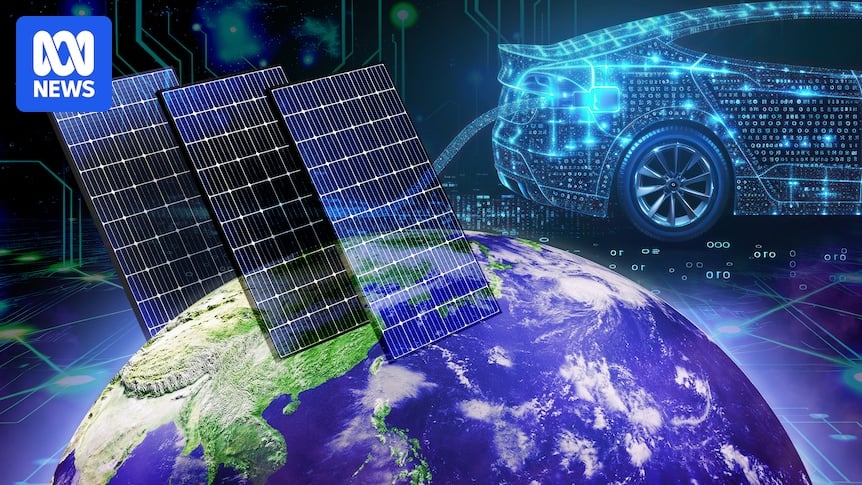The growth of atmospheric CO2 is still accelerating. There has been zero evidence that this has changed.
Yes, renewables. But for every solar panel installed, our civilization’s lust for energy means that most of that added solar power is consumed without any appreciable commensurate decline in fossil fuel consumption.
not to forget, the stupid ai craze is generating crap ton of emissions
But AI does still produce something, cryptomining consume stupid ammounts of energy, and produce nothing usefull.
Oh, sure, we have defined the specific string of numbers that the crypto algorithm generates as important in highly specialized systems, but they are completely and utterly useless in other contexts.
But AI does still produce something
I don’t think that wild, uncontrollable hallucinations counts as “productive output”.
Output, yes, but not productive output.
LLMs produce a string of outputs (from numbers) that are sometimes useful in some contexts and utterly useless in other contexts 🙃
Yes, the atmospheric CO2 is still rising due to emissions from previous decades.
The decline mentioned in the title is the current emmisions. The article goes on to explain it like this:
Locally, Europe and America have lowered their emmisions in the recent years, but global emmisions have still rised due to China emitting even more.
This June however, China’s emmisions have also decreased, so it might be a sign of a peak being reached.
Energy consumption is still increasing, but renewable sources provide enough for that, and it’s economical the best option, so the rising demand does not cause more emmisions.
Personally, I’m afraid it is too soon to tell. I also wonder where all the drilled oil and mined coal goes, because if there is an actual decline in fossil fuel usage, we’d be hearing from the oil companies and experience lower gas prices etc. Any fossil that is mined or pumped up is going to get burned, so I’d really like to see a decline in fossil extractions before celebrating.
Also, in order to address the atmospheric CO2 levels, we need something entirely different. Forests and CO2 capture etc., which have a long way to go still.
the atmospheric CO2 is still rising due to emissions from previous decades.
Tell me you don’t understand atmospheric CO2 without saying you don’t understand it.
Atmospheric CO2 represents the immediate, real-time, zero-delay composition of the atmosphere. As in, the current value is what currently exists.
And an acceleration curve in that value means that CO2 production is still increasing. if the curve is curving up, more CO2 is being released today than had been released yesterday.
https://lemmy.ca/pictrs/image/f46a3bf9-388a-4cac-92ff-0604e402c291.png
Once that curve points downwards over more than a year or so, then I will become cautiously optimistic. Until then, I will not submit myself to counterproductive hopium.
There is a slight complexity to this as methane breaks down into CO2 over a period of about 20 years, in the meantime it contributes a higher warming effect. But there is a measure called CO2e which is the equivalent including the other green house gases and it too has been accelerating so it doesn’t change the point its just there are some prior emission impacts on current CO2 in the atmosphere.
and it too has been accelerating so it doesn’t change the point its just there are some prior emission impacts
Say you don’t understand emissions measuring without actually saying you don’t understand emissions measuring.
Past emissions only place emissions up to a value. Current emissions are what determine whether our emissions output is continuing to accelerate, or are actually slowing down.
And yesterday’s emissions continue to be smaller than today’s emissions. That is why it’s called accelerating emissions.
And yesterday’s emissions continue to be smaller than today’s emissions. That is why it’s called accelerating emissions.
Not necessarily true. According to the article, it’s quite possible that yesterday’s emissions are the same as today’s emissions. Meaning, we’ve stopped increasing emissions.
Until that graph curves over, it isn’t true.
Evidence trumps wishes and fantasies. I refuse to get ensnared by hopium.
It’s a prediction. We don’t have accurate data for the current year.
Wondering if you read the linked article which presents evidence that this has changed?
But then everything wouldn’t be Always Bad All the Time and a bunvh of people here can’t handle that.
You really should read the article. The hypothesis is that global emissions peaked last year and so the cumulative emissions graph that you’re focusing on would start to curve downward this year or maybe next. We’ll “see by the end of the year”.
Again, in the article, things are changing wildly fast and you won’t see that yet in a lagging indicator like cumulative CO₂.
Until that graph curves over, it isn’t true.
Evidence trumps wishes and fantasies and wild guesses. I refuse to get ensnared by hopium, especially when the hard evidence isn’t even in yet.
The worst effects of climate change haven’t happened yet so I guess that isn’t true either and you’ll go off at anyone who’ll attempt to use the best available information and modelling to predict that.
One should not forget that all these things are not produced and manufactured with zero emissions. EV batteries still need huge amounts of CO2 emissions, photovoltaic cells are far from zero emissions and with the huge amounts of untapped potential to make existing stuff emitt less CO2, there will still be a lot of growth in emissions…
And once emissions begin showing a downward-facing curve, indicating decreasing emissions, I will begin to be hopeful.
But when emissions are still curving strongly upward, with no hint of even a straight trend line (indicating that emissions growth has halted), I continue to be brutally and hyper-realistically pessimistic.
While China is building a LOT of renewable energy and it should be applauded for it, it is not the only thing that are building. China accounted for 95% of the world’s new coal power construction activity in 2023, according to the latest annual report from https://globalenergymonitor.org/
Yeah China’s explosive power needs growth and even the AI rose. It’s driving world power needs through the roof.
To me, that’s kind of good news, if that means essentially only one place is building new coal plants and it’s the same place that’s building a ton of new solar plants and EV’s, too.
Shout out to every “EVs are bad actually” person for being a dumbass who can’t sort out their priorities.
Why mine minerals when you can mínu coal and drill for gas and oil ability?
No, EVs in general aren’t a bad idea. But, to my knowledge, they have a lot of problems that no one is even getting close to solving on a global basis. There’s recycling of and mining for components, preferably in a sustainable way and without child workers. Also, EVs are still expensive as fuck compared to ICE vehicles, especially on the used market. And if you’re buying used, then the battery doesn’t even have full capacity anymore. And even IF you can get it switched by a mechanic (if you can even find one willing to do that), that is just even more money you have to spend upfront.
Granted, most of that might change over time, but for most people atm it’s just not feasible to buy an EV.
- there are companies claiming they can recycle car batteries, but there aren’t enough old batteries yet
- yesterday someone posted an article about a car model with identical price between gasoline version and battery version
- globally there are cheap EVs
- used EV prices have tanked in the last two years. They may be comparable to similar gasoline cars now. However if you’re looking for cheap, there are no older ones yet.
When can we get some of those EVs and stop pretending that Tesla is a legitimate automobile company?
Yes, please
The sun is the biggest source of Energy on Earth. There’s no point trying to find an alternative energy source, because even if it existed, it would probably be much more expensive than getting energy directly from the sun.
and since all energy comes from the sun anyways, accessing it in the most direct way possible is obviously both most efficient and also least complicated. and that is why we have photoelectric machines, aka. PV panels.
We still need storage or alternative energy sources for nighttime and cloudy days.
Edit: weird, my other comment wasn’t showing up so I re commented and now both are showing
We can just remove the clouds and set up giant space mirrors.
Funny enough that is one potential solution. https://en.m.wikipedia.org/wiki/Space-based_solar_power
Probably simpler and cheaper to do wind power though.
Baseline load and nighttime load is still a problem, so either we need storage or we need additional sources.
Yup, nuclear.
Whatever is quickest, cheapest, and most effective for the area. Which will be nuclear in some cases, geothermal in others, hydropower in others…we need to do whatever works best and not shoehorn ourselves into (or out of) any particular zero carbon source.
Absolutely, hydro is a great energy source.
Idk man. Cloud and air efficiency seems higher, even with the added propeler and magnetism step in there. Then again lost panel energy goes into air.
deleted by creator









